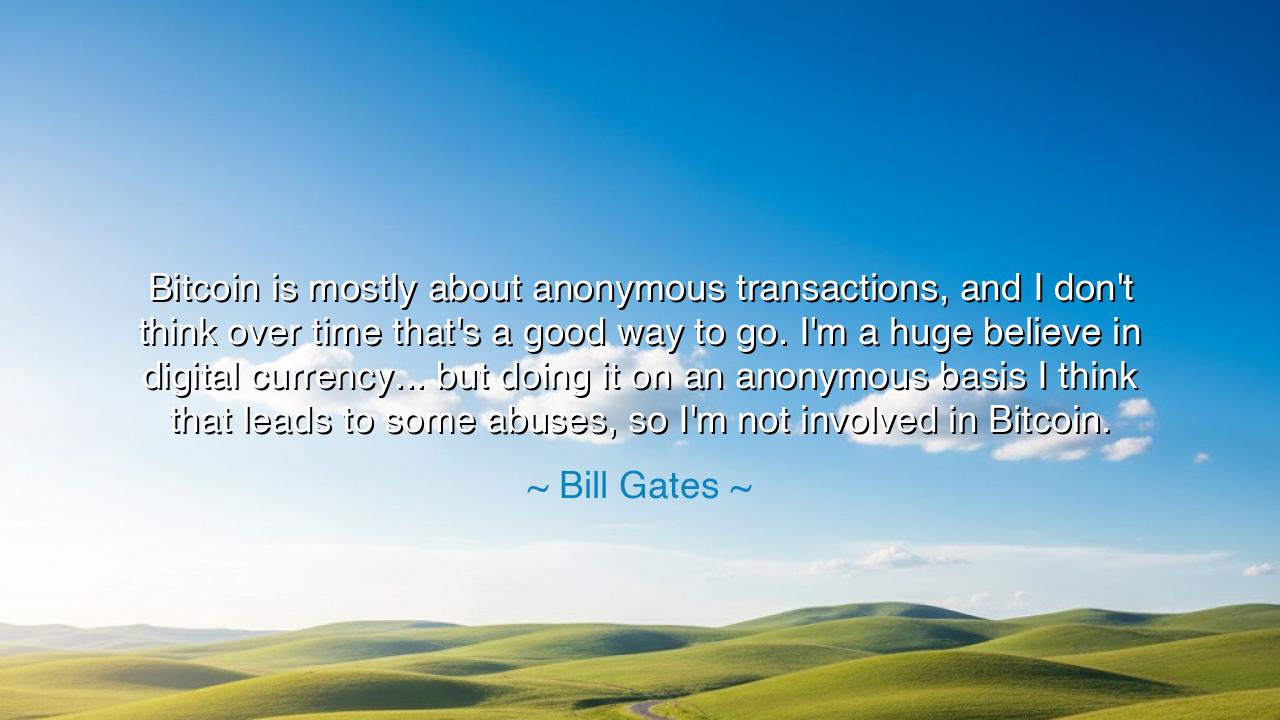
Bitcoin is mostly about anonymous transactions, and I don't
Bitcoin is mostly about anonymous transactions, and I don't think over time that's a good way to go. I'm a huge believe in digital currency... but doing it on an anonymous basis I think that leads to some abuses, so I'm not involved in Bitcoin.






The words of Bill Gates, “Bitcoin is mostly about anonymous transactions, and I don't think over time that's a good way to go. I'm a huge believer in digital currency... but doing it on an anonymous basis I think that leads to some abuses, so I'm not involved in Bitcoin,” are a reflection not only of technology but of morality, law, and the destiny of society. They are not the words of one ignorant of innovation—Gates himself helped usher in the digital revolution—but rather of one who has seen the double edge of progress. He acknowledges the power of digital currency, yet he warns against the shadows it may breed if it grows without accountability.
At its heart, this quote is about the tension between freedom and responsibility. Bitcoin, born from the idea of decentralization, promised liberation from banks, governments, and oversight. It gave power to the individual, the ability to transact without borders. Yet Gates reminds us that anonymity, while alluring, carries dangers. For when no one is accountable, the tools of freedom may become weapons of crime, fraud, and exploitation. What begins as a dream of liberty can, without safeguards, descend into abuses that harm the very people it sought to empower.
The origin of Gates’s view lies in his lifelong belief that technology must serve humanity. Having witnessed how computers transformed the world, he also saw how unchecked tools could be misused—viruses spreading through the internet, misinformation flourishing in the digital age, and innovations turning into instruments of harm when morality lags behind capability. His caution about Bitcoin stems from the fear that without regulation or identity, digital currency could strengthen black markets, empower terrorists, or strip societies of the rule of law. His stance is not against innovation, but against innovation divorced from ethical responsibility.
History has shown us the truth of this balance. Consider the early days of paper money in medieval China. It freed commerce from the limits of metal coinage and opened the gates to vast trade. But when its issuance fell into corruption, when it lacked oversight, inflation and collapse followed, destroying economies. Or think of the invention of gunpowder, first used for defense and later unleashed as destruction beyond imagination. Each new tool of mankind carries both promise and peril. Gates’s warning about Bitcoin is but the modern echo of this ancient truth: progress must be governed by wisdom.
The deeper wisdom of his words is that trust is the foundation of society. Currency, whether metal, paper, or digital, is not valuable because of its form, but because of the trust people place in it. If that trust is corroded by secrecy, by abuse, by crime hidden in the shadows of anonymity, then even the most advanced currency will wither. Gates urges us to remember that the future of finance must not only be about speed and decentralization, but about preserving the integrity that makes human cooperation possible.
To the seekers of wisdom, let this be a teaching: embrace new tools, but do not abandon discernment. Ask not only what technology can do, but what it should do. For the freedom of anonymity may feel empowering, but if it nurtures lawlessness, it becomes a chain that binds the innocent. True freedom is not the absence of responsibility, but the presence of justice.
The practical lesson is this: when engaging with new technologies, weigh not only the personal gain, but the collective good. If you embrace digital currency, seek transparency and safeguards that prevent abuse. Support systems that encourage innovation while protecting the vulnerable. Do not be seduced by the allure of secrecy, for in secrecy, corruption grows. Instead, align with tools that uplift communities, strengthen trust, and ensure that progress serves the many, not the few.
Thus, let Bill Gates’s words endure as both a caution and a charge: Bitcoin’s anonymity may tempt, but accountability sustains. True progress lies not in building systems that escape the light, but in creating tools that can withstand the light. For in the marriage of innovation and responsibility lies the path to a future both prosperous and just.






AAdministratorAdministrator
Welcome, honored guests. Please leave a comment, we will respond soon